Confused about ISIS? A simple explanation...
By:
EDITOR'S UPDATE: The extremist group Islamic State, also known as ISIS or ISIL, has claimed responsibility for the deadly string of attacks in Paris on Friday night that left more than 120 dead, over 350 wounded, and almost 100 people in critical condition, according to the Associated Press. The group, which has gained notoriety for its brutal tactics, is linked to a string of other recent attacks, and is now facing growing opposition from Western countries and Western-backed forces in the Middle East.
1. What, or who, is ISIS or ISIL?
ISIS (also known as ISIL or IS) is a Sunni militant group seeking to create its own state, governed by their interpretation of the Laws of the Quran, and to destroy all other branches of Islam as well as convert or destroy all non-Muslims.
Islam has undergone much evolution and many splits since its founding 1400 years ago. The biggest branches are Sunni and Shia, but within each there have been many further splits. ISIS is part of a Sunni branch known as Salafists, who reject modern Islam and prefer to return to its early teachings. (Click here for a visual depiction of the branches of Islam.)
The initials stand for the Islamic State of Iraq and Syria -- or the Islamic State of Iraq and the Levant (Levant being a geographic term referring to the area that includes Cyprus, Israel, Jordan, Lebanon, western Syria, Palestine, eastern Egypt, and southern Turkey) or just the Islamic State, hence the three different abbreviations. They have been called a terrorist group by a number of governing bodies including the United States, the United Kingdom, and the United Nations.
2. Why have I only heard about them recently?
ISIS is a successor to al-Qaeda in Iraq (which was the Iraqi cell of Osama bin Laden's al-Qaeda), so in a sense they've only been around for a decade. They have been building a support base and taking control of Sunni-majority areas in Iraq for several years, but they've really hit their growth spurt in the 3 years since the Syrian civil war by spilling into Syria and rallying extreme Sunnis to take up arms with them. At first ISIS had small weapons but as they've grown in numbers, they've taken over more land in both Syria and Iraq. This land has provided valuable resources, such as oil and wheat, which ISIS sells to buy more powerful weapons. They have also benefited from acquisitions of American weapons following their victories over Iraqi government forces. As they've increased their numbers and acquired stronger military resources, the scale and scope of their brutality has grown, commanding the world's attention.
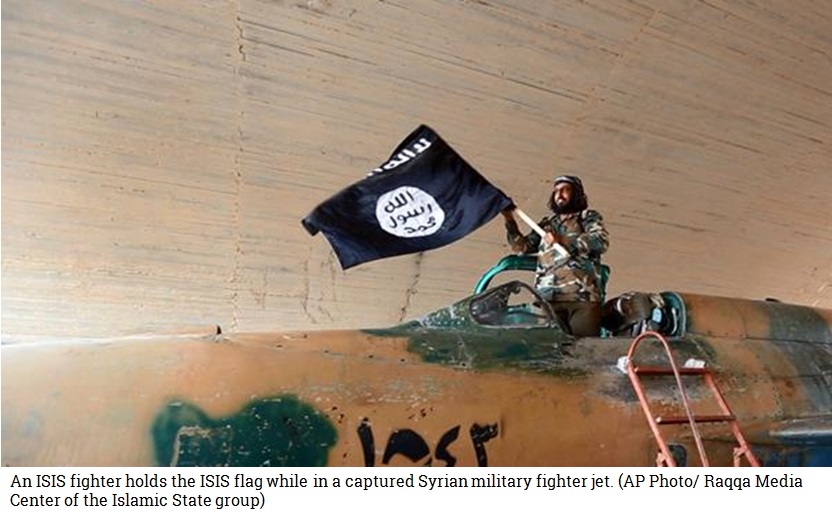
3. Wait, I thought the rebels in Syria are non-religious moderates who were receiving aid from the United States?
Some of them are. But we're beginning to get a clearer picture of the players in Syria and what they seek to accomplish.
A lot of people hate Syrian President Bashar al-Assad-- with reason. He is known to capture, imprison, torture, and kill people who disagree with him and he brutally cracked down on Syrian protests while countries around the Middle East were 'Arab Springing' their own dictators out of office. People throughout Syria began to rebel against President al-Assad's harsh tactics. That rebellion swelled into a full-fledged civil war in 2011, during which nearly 200,000 people have been killed. However, the rebels fighting President al-Assad are divided into many groups, some of which detest each other as much as they reject al-Assad's regime.
The rebel group best known to Westerners is the Free Syrian Army, founded by Syrian military who defected to fight against President al-Assad. They are moderates not guided by religious dogma and have been embraced by the United States, which has supplied them with weapons and trained them; but their effectiveness has been questioned.
Meanwhile, extreme religious groups have led the fighting (and been embraced by locals) in other parts of the country. Chief among them is ISIS, which slipped into Syria from their base in Iraq when the civil war began and recruited a following.
4. What's happening in Syria now?
The rebels and al-Assad's forces are still fighting, but it's now clear there are wars being carried out between multiple players.
As shown in light pink in the map below, al-Assad controls much of central and coastal Syria; the Free Syrian Army and other rebel groups (in green in the map) are active in pockets around the southwest, central Syria, and Northwest Syria; Kurdish rebels (in yellow) are present along much of Syria's northern border (the Kurdish are an ethnic group with many different religions, but a majority are of the Shafi branch of Sunni Islam); and ISIS (in gray) has grabbed North and East Syria.
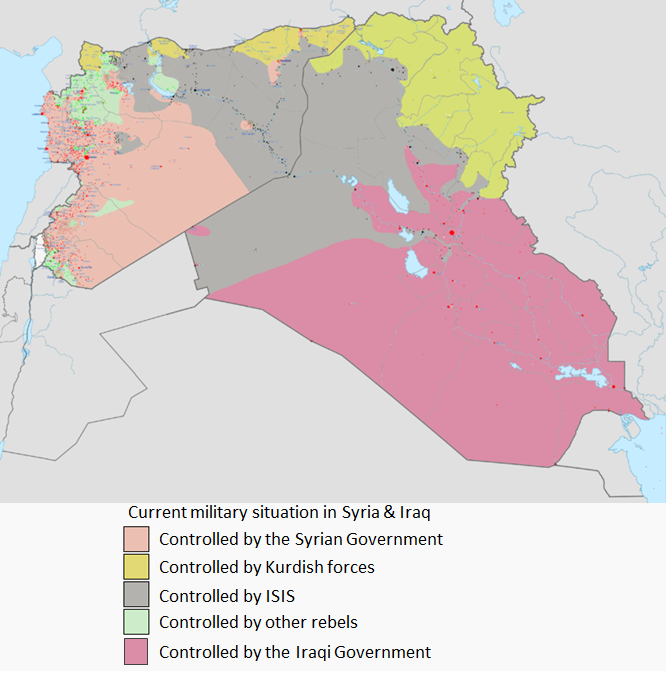
The Free Syrian Army has stated repeatedly that they are unable to control territory and are focusing instead on destabilizing al-Assad's forces. Taking a noticeably different strategy is ISIS, which has taken an interest in building up the regions they control -- not just fighting.
5. What's happening in Iraq now?
ISIS fighters in Iraq have also increased their presence, galvanized in part by Sunni anger at Iraqi Prime Minister Nouri al-Maliki, who is a Shia Muslim. (al-Maliki stepped down on August 14, 2014 after many of his supporters, including the United States, called for his resignation.) ISIS has continued grabbing more land, fighting and killing Iraqis (including brutal attacks against and rape of Kurds in northern Iraq that have achieved international attention), and attempting to seize infrastructure such as the Mosul Dam (the largest dam in Iraq).
One community of Kurds in northern Iraq, known as the Yazidis, have been particularly targeted by ISIS. Unlike non-Sunni Muslims in other captured territories, Yazidis have reportedly not been given the opportunity to convert, but instead have been raped, killed or enslaved. Gyorgy Busztin, the deputy special representative in Iraq of the UN security general, said “We believe that what they [ISIS] have done [to the Yazidis] may be classified as genocide and a crime against humanity.”
Meanwhile the United States has carried out airstrikes against ISIS in Iraq to support Kurdish and Iraqi fighters.
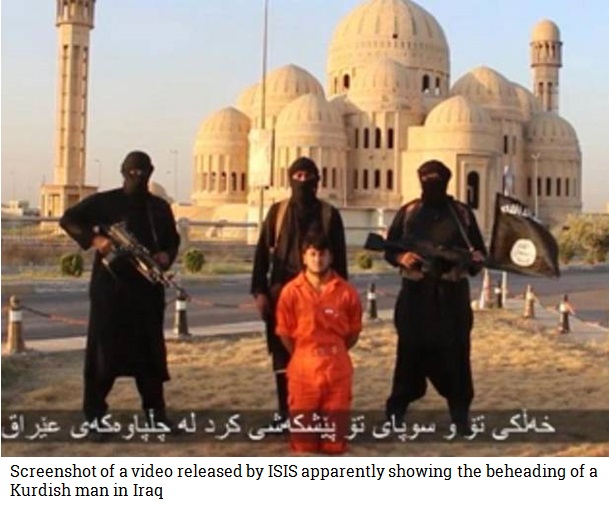
6. What do you mean ISIS is 'building, not just fighting'?
As ISIS has expanded, they have secured oil fields, controlled access to sources of water (rivers and dams), and developed a local government and judicial system that tries cases based on Sharia Law (Sharia is Islamic religious and moral code that comes mostly from the Quran).
When ISIS takes control of land they seek to "purify" it by killing all Muslims and non-Muslims who don't accept their interpretation of the Quran. (The notable exception being groups such as the previously-mentioned Yazidis, who may be killed immediately without opportunity to convert.)
In the process they've won local supporters, fighters, and Jihadist wives for their fighters. ISIS has also attracted more than 1,000 fighters from Western nations (including as many as 800 from the United Kingdom and 150 from the United States) and driven non-Sunni Muslims, Christians, and anyone else in their path into refugee status.
Here is a (42-minute long) video documenting how ISIS is 'building, not just fighting':
7. ISIS is also doing plenty of killing though, right?
Yes, ISIS is also doing a lot of fighting and killing. In addition to weapons they've purchased, they have seized weapons from the Iraqi army, Syrian army, and other rebel groups in Syria.
There have been widespread reports of rape, violence against women, and captured women being sold or given to militants. ISIS is also arming children as young as 9 and committing mass murder and possibly genocide in Iraq and Syria.
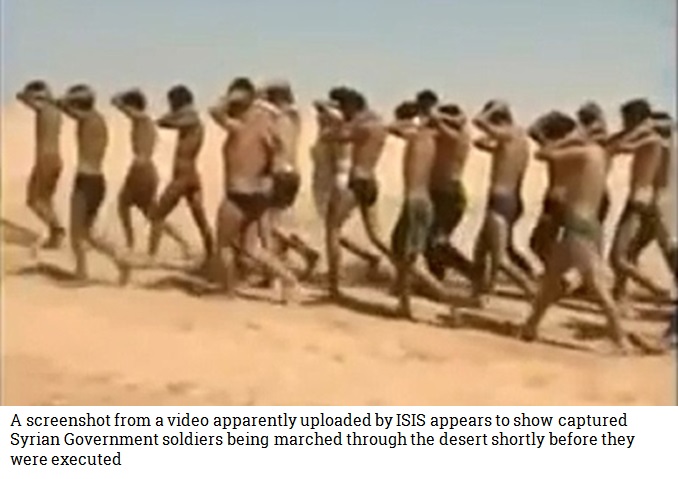
ISIS strictly enforces Sharia Law in the territory they control, which means dishing out heavy punishments including whippings, imprisonment and death for not following dress code, having alcohol in your home or using drugs. They have forced non-Sunni Muslims to convert, be killed, or, in a few lucky cases, pay 'non-Muslim' taxes.
They have also been known to capture journalists -- they recently waterboarded several journalists, including James Foley, who was beheaded in a video widely distributed around the internet. A number of additional ISIS beheadings have been recorded and released online.
8. How are they funding all this?
ISIS has taken over more and more oil fields in Iraq as their land control has grown. They load the oil onto trucks, sneak it into Turkey, Jordan, Syria, and other parts of Iraq, and sell it on the black market, often directly to oil refineries, for below standard oil prices. Many believe ISIS is now earning between $1 million and $2 million per day from these sales (some speculate as much as $4 million per day).
These countries appear to be enjoying the infusion of low-cost oil and are not making strong efforts to prevent the sale of ISIS goods. The United Nations Security Council sent a 'friendly' reminder on July 28, 2014, that trading with or buying oil from ISIS is illegal.
9. How big is ISIS now?
Big. They have taken control of large swaths of North and East Syria, and in the process, their numbers of fighters as well as their financial resources have grown, which has enabled them to secure and increase their hold on much of Western Iraq. Estimates put their number of well-trained fighters between 10,000 and 20,000 (others have put the number as high as 80,000 -- part of the discrepancy appears to depend on whether you define a 'fighter' as a mostly-untrained member of ISIS with a gun). The New Yorker estimates ISIS controls 35,000 square miles, an area approximately the size of Jordan.
Fareed Zakaria recently said:
There’s a sense that ISIS has become what al Qaeda always wanted to be. Remember, the world al Qaeda means base. Since 2001, al Qaeda really hasn’t had a base. It's been running around in mountains and caves.
ISIS is developing a very large, deep and sophisticated base. It has a financial base... It has the ability to sell oil and wheat at a bargain. And of course it has this extraordinary military capacity. That military capacity is morphing in the wake of American air strikes. It’s moving from an open ground strategy, taking towns, to a guerilla strategy, hiding within towns. A kind of Hamas strategy. But all in all, if you look at that this, this is the most significant terrorist organization I think we’ve really ever faced.
10. What's happening now? What is ISIS's end goal?
The United States has carried out air strikes against ISIS in Iraq to help Kurdish and Iraqi forces regain ground and protect themselves. Others have argued that the best way to fight ISIS is to supply the Kurds with weapons, which is what the German government is doing. Meanwhile, French President Francois Hollande is calling for a joint response from the international community to ISIS that does not coordinate with al-Assad's forces in Syria given al-Assad's own human rights record.
The rapid rise of ISIS has forced unusual alliances, as depicted in this graphic (from the Wall Street Journal):
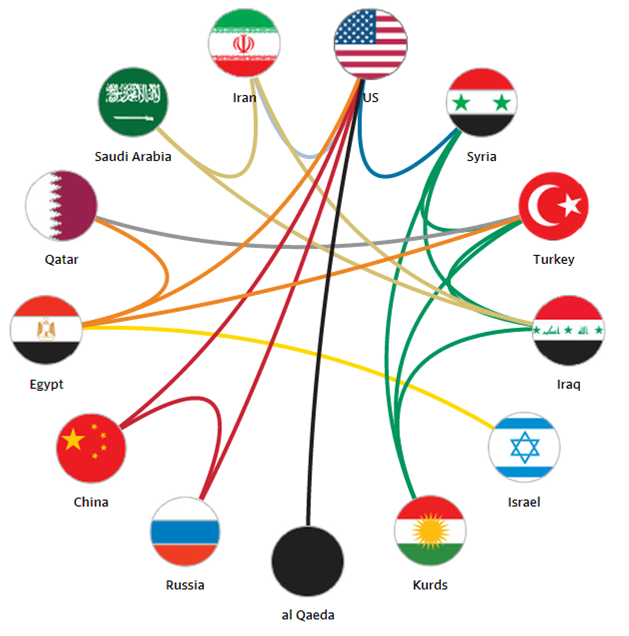
ISIS's goal is a 'purified' world -- meaning, get rid of everyone (Sunni Muslim or otherwise) who does not agree with their particular religious view and with the way they enforce their laws. In the short-term, their focus is on achieving their own state in the Levant, killing or converting anyone in their way, and building up resources so that in the longer-term they may shift their focus to more ambitious targets: Europe, the United States, and the rest of the world.
